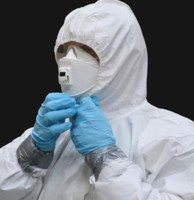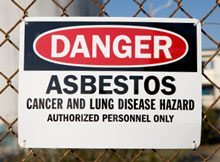Asbestos Sprayers Face Higher Lifetime Mesothelioma Risk
 Workers whose job it was to apply spray-on asbestos insulation may be at even higher risk for lung cancer and malignant mesothelioma than other types of asbestos workers.
Workers whose job it was to apply spray-on asbestos insulation may be at even higher risk for lung cancer and malignant mesothelioma than other types of asbestos workers.
A Finnish study of four different groups of asbestos workers found that asbestos sprayers had a standardized incidence ratio (SIR) for malignant mesothelioma as much as 100 times that of the general population.
The Danger of Spray-On Asbestos
For decades, asbestos was prized for its strength and heat resistance and was a popular component of spray-on insulation.
Before new asbestos regulations were put into place in the early 1980s, spray-on insulation could contain up to 50 percent asbestos. Lightweight and inexpensive, sprayed asbestos was considered one of the most efficient fireproofing materials for coating beams, girders and other structural elements.
Today, asbestos is recognized worldwide as a toxin and the primary cause of mesothelioma. Scientists now know that most people who contract pleural mesothelioma have inadvertently inhaled microscopic asbestos fibers such as those released into the air when asbestos spray is applied.
The fibers stay in the body, triggering chronic irritation and inflammation that can cause healthy cells to become cancerous.
Measuring Mesothelioma Incidence
To measure the incidence of mesothelioma among various types of asbestos workers, scientists with the Finnish Institute of Occupational Health used data from the Finnish Cancer Registry through 2012.
They focused on four different groups of asbestos workers – those who worked in asbestos mines, patients with a lung-scarring disease called asbestosis, asbestos sprayers, and a group of workers who had already take part in a screening study of asbestos exposure at work.
The team measured how common it was for members of each group to receive either a mesothelioma diagnosis or a diagnosis of lung cancer.
“The SIR for mesothelioma varied from about threefold to >100 fold in the different cohorts,” writes study author Pia Nynas in Safety and Health at Work. “Asbestos sprayers were at the highest risk of mesothelioma and lung cancer.”
But the other cohorts included in the study were not unaffected by their asbestos work. According to the report, every group had a high SIR for mesothelioma. Those in the screening group, who had the lowest level of asbestos exposure, also had the lowest incidence of mesothelioma, which, say the authors, “might suggest dose-responsiveness between asbestos exposure and mesothelioma.”
Source:
Nynas, P, et al, “Cancer Incidence in Asbestos-Exposed Workers: An Update on Four Finnish Cohorts”, June 2017, Safety and Health at Work, pp. 169-174





